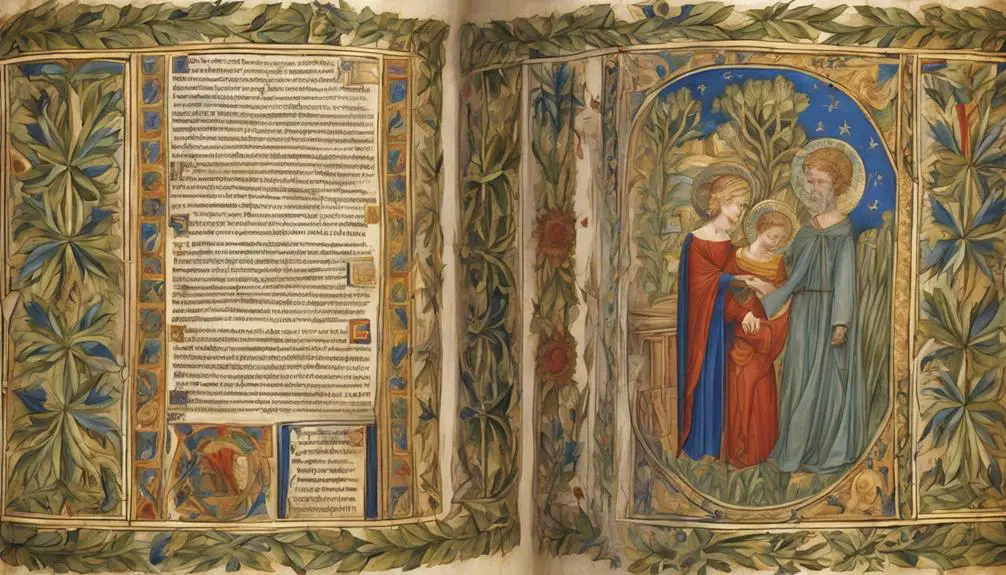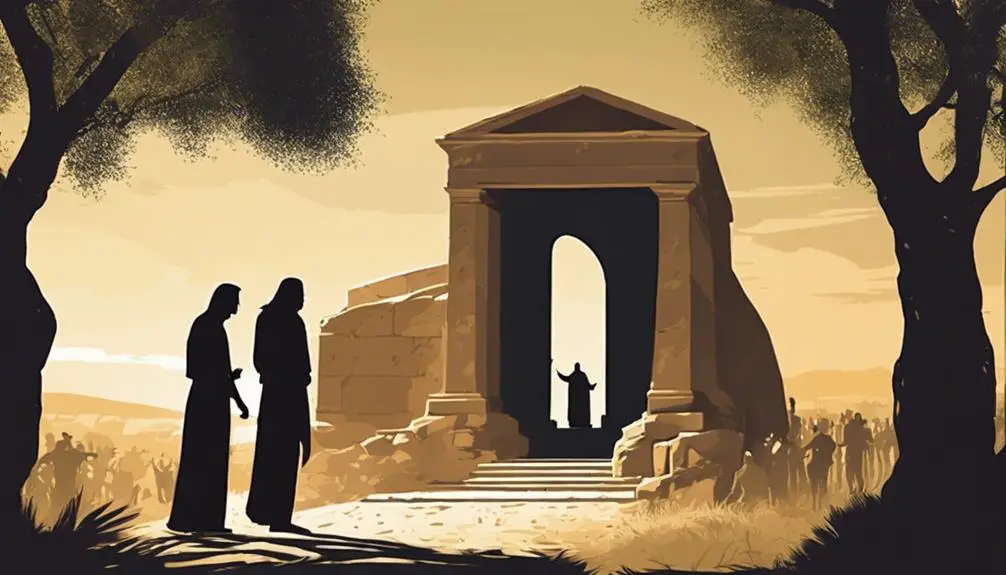Discover the untold stories of biblical characters starting with 'L'—from Leah's heartache to Lydia's faith, each name holds a hidden tale.

Names That Start With L in the Bible
Like hidden treasures scattered throughout ancient texts, names starting with 'L' in the Bible hold stories of faith, betrayal, and redemption that you might not have explored fully yet.
You've likely heard of Lazarus, whom Jesus famously raised from the dead, but what about Leah, Jacob's first wife, or Lydia, a devout convert whose story is equally compelling?
Each name carries a narrative that has shaped centuries of belief and culture. By examining these individuals, you'll uncover layers of meaning that might change how you view biblical history.
Curiosity piqued? Let's uncover these stories together and see what lessons they hold for us today.
Key Takeaways
- Leah's narrative highlights her significant role in Israel's tribal origins and her complex marital relationships.
- Lazarus's resurrection by Jesus showcases divine power and emphasizes hope and belief in life after death.
- Lydia's conversion and support play a crucial role in the spread and establishment of the early Christian church.
- Luke's authorship of his Gospel provides valuable insights into Jesus' life and teachings, contributing to theological and historical scholarship.
Leah: Jacob's First Wife

Leah, initially overshadowed by her sister Rachel, emerges as a pivotal figure in biblical narratives, being Jacob's first wife through a deceptive arrangement orchestrated by her father, Laban. This union, although not founded on mutual desire, becomes central to the lineage of the Israelites through Leah's children. You'll find that the marriage dynamics between Leah, Jacob, and later, Rachel, significantly impact the socio-religious fabric of their time. Leah's role isn't merely passive; despite the initial lack of affection from Jacob, she navigates her position with resilience, contributing profoundly to their lineage.
The birth of Leah's children, particularly her sons, who become forefathers of the Israelite tribes, underscores her importance. Each child's name reflects Leah's hope and despair within her marital journey, showcasing a nuanced understanding of her circumstances. Through Leah's narrative, you're invited to explore the complexities of human relationships and divine intervention. Her story, marked by rivalry, faith, and redemption, enriches the tapestry of biblical history, illustrating how individuals' lives intricately weave into the larger divine plan. Leah's legacy, thus, isn't confined to her being Jacob's first wife but extends through the tribes of Israel, highlighting her pivotal role in biblical narratives.
Laban: Leah and Rachel's Father
How does Laban, the father of Leah and Rachel, emerge as a pivotal yet complex figure within the biblical narrative, influencing not only the fate of his daughters but also the broader trajectory of Israelite history?
Laban's role is multifaceted, intertwining themes of family, deceit, and providence. His most notable actions involve Laban's deception, a critical turning point that sets the stage for future events. By deceiving Jacob into marrying Leah before Rachel, Laban not only alters the personal lives of his daughters but also impacts the lineage of the Israelites. This act of trickery necessitates Jacob's extended service, during which he labors for Laban for a total of fourteen years to marry both sisters.
Laban's complex character is a catalyst for significant developments in the biblical story. His cunning strategies and decisions reflect broader themes of survival and negotiation within familial and divine contexts. Through Laban's actions, the narrative explores the consequences of deceit, the intricacies of familial bonds, and the unfolding of divine plans. Laban's influence extends beyond his immediate family, shaping the destiny of the Israelite nation in profound ways.
Lazarus: Raised by Jesus

In the narrative of the New Testament, Lazarus's resurrection by Jesus stands as a pivotal demonstration of divine power and a prefiguration of the Resurrection. This event, often referred to as the 'Death to life miracle,' encapsulates the essence of Jesus's ministry and his authority over life and death. Lazarus's resurrection isn't simply an act of returning a life; it's a profound statement on the nature of faith and the promise of eternal life for believers.
Delving deeper, you'll find that Lazarus's resurrection serves multiple layers of theological significance. Firstly, it solidifies Jesus's identity as the Son of God, endowed with divine power. Secondly, it acts as a tangible manifestation of hope for the early Christian community, reinforcing the belief in life after death. This miracle, therefore, isn't just a historical account but a cornerstone of Christian eschatology.
Moreover, the narrative emphasizes the personal relationship between Jesus, Lazarus, and his sisters, Mary and Martha, showcasing Jesus's compassion and humanity. The event transcends a mere miracle; it's a testament to Jesus's role as a redeemer, offering not only physical restoration but spiritual renewal.
In essence, Lazarus's resurrection is a multifaceted event, rich in symbolism and foundational to Christian doctrine, epitomizing the transition from death to life as the ultimate miracle.
Lydia: A Devout Convert
Lydia's conversion to Christianity, as recorded in the Acts of the Apostles, marks a significant milestone in the early Christian church's expansion. You'll find her story not just a testament to personal transformation but also as an emblematic instance of how new faiths spread through social and economic networks.
Lydia, a dealer in purple cloth, represents the intersection of religion and commerce, highlighting the role of the purple trade in propagating Christian beliefs. Her profession isn't merely a detail; it's crucial in understanding her influence. The purple trade was lucrative and associated with wealth and status.
Lydia's involvement suggests she was a woman of means, which provided her with the resources to offer hospitality to Paul and his companions. This act of kindness wasn't trivial. Lydia's hospitality facilitated the establishment of a Christian community in Philippi, demonstrating the strategic role of social networks and economic resources in the early church's growth.
Luke: The Gospel Author

Shifting focus to another influential figure, we encounter Luke, known not just as a companion of Paul but also as the meticulous author behind the Gospel bearing his name. Luke's travels with Paul significantly influenced his perspective and are thought to have informed the detailed accounts found in his Gospel. His narrative provides a unique blend of theological insight and historical detail, setting it apart from other biblical texts.
The authorship debate surrounding Luke's Gospel is both complex and fascinating. Scholars methodically analyze textural evidence, historical context, and linguistic style to determine the authenticity of Luke's authorship. While traditional views strongly support Luke as the author, critical analysis reveals a nuanced discussion about the possibility of multiple contributors or later edits. This debate enriches our understanding of the text's origins and underscores the importance of methodical scholarly inquiry.
Luke's contribution to the biblical canon goes beyond mere authorship; his work offers a comprehensive account of Jesus' life, teachings, and impact. Through a scholarly lens, you can appreciate the intricate layers of Luke's narrative and the painstaking research that underpins the ongoing authorship debate.
Frequently Asked Questions
How Do Names Starting With 'L' in the Bible Reflect Cultural or Linguistic Influences of the Time?
You're exploring how names reflect cultural or linguistic influences. It's clear linguistic evolution and cultural assimilation play key roles. By analyzing these names, you'll see how languages and cultures merged over time.
This isn't just about letters; it's a window into how societies interacted and changed. Your approach should methodically dissect these influences, revealing a tapestry of human history woven into the very fabric of our language and cultural identity.
Are There Any Prophetic or Symbolic Significances Associated With Biblical Names Starting With 'L'?
Ever wondered how names carry deeper meanings?
Yes, biblical names beginning with 'L' often hold prophetic or symbolic significance, reflecting leadership lessons and linguistic evolution.
These names not only tell tales of ancient times but also guide us in understanding complex human traits and divine prophecies.
Through a scholarly lens, one can see how they methodically offer insights into the cultural and spiritual landscape of their era, making them more than mere labels.
How Do the Meanings of Names Starting With 'L' in the Bible Compare to Their Meanings in Contemporary Contexts?
When you delve into linguistic evolution, you'll find that names starting with 'L' have undergone significant shifts from their original biblical meanings to contemporary reinterpretations. This transformation reflects changes in language, culture, and societal values.
Analyzing these names methodically reveals a fascinating journey of adaptation and reinterpretation. In today's context, meanings often diverge from their ancient roots, showcasing the dynamic nature of language and the influence of cultural evolution on personal identity.
What Are Some Lesser-Known Stories or Characters With Names Starting With 'L' in the Bible That Have Impactful Lessons or Morals?
You're exploring tales that resonate through time, teaching profound lessons.
Delving into such narratives, consider Levi's inheritance, not just land but a role in spiritual leadership, illustrating the value of legacy beyond material wealth.
Similarly, Lot's dilemma, choosing between immediate gratification and righteous path, serves as a cautionary tale against short-term temptations.
These stories, though less known, offer rich insights, encouraging a deeper understanding of moral and ethical living.
How Have Names Starting With 'L' From the Bible Influenced Modern Naming Trends in Various Cultures or Religious Communities?
You're exploring how biblical names beginning with 'L' have shaped modern naming conventions across cultures and religious groups. These names often carry significant legal implications, influencing identity and inheritance rights.
The linguistic diversity they introduce reflects the broad cultural adoption and adaptation of biblical names. Analyzing this phenomenon reveals a methodical blend of tradition, religious significance, and the evolving nature of language and identity in contemporary society.
Conclusion
In analyzing biblical names starting with 'L,' it's intriguing to note that less than 10% of prominent biblical figures bear names starting with this letter. This statistical rarity underscores the unique roles and narratives of individuals like Leah, Laban, Lazarus, Lydia, and Luke within the scripture.
Their stories, while individually distinct, collectively contribute to the rich tapestry of biblical history and theology, emphasizing the diversity and depth of character development within these sacred texts.



Sign up